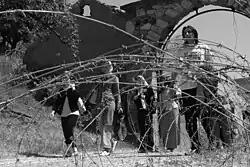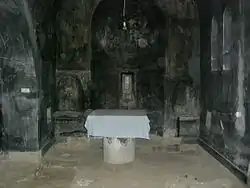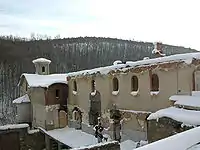Devič
The Devič Monastery (Serbian: Манастир Девич, romanized: Manastir Devič; Albanian: Manastiri i Deviçit) is a Serbian Orthodox abbey in Kosovo. It was built in 1434 and is dedicated to St Joanikije of Devič. Devič was declared Monument of Culture of Exceptional Importance in 1990, and it is protected by the Republic of Serbia.
 Devič Monastery reconstruction after it was burned down in 2004 | |
| Monastery information | |
|---|---|
| Full name | Манастир Девич |
| Other names | Manastiri i Deviçit |
| Order | Serbian Orthodox |
| Established | 1434 |
| Dedicated to | St. Joanikije of Devič |
| Diocese | Eparchy of Raška and Prizren |
| People | |
| Founder(s) | Despot Đurađ Branković |
| Important associated figures | Đurađ Branković Patriarch Makarije Euphemia the Nun |
| Architecture | |
| Heritage designation | Cultural monument of Exceptional Importance |
| Designated date | 24 March 1948 |
| Site | |
| Location | Skenderaj, Drenica, Kosovo |
| Public access | Limited |
History
The founder of the monastery is Despot Đurađ Branković, who had it built in memory of his daughter. In the Ottoman census from 1455, the monastery is mentioned as the church of the Theotokos (dedicated to The Entry of the Most Holy Theotokos into the Temple). During Turkish occupation the monastery was pulled down, but the church and the site with the grave of St. Joanikije was reconstructed, and was painted in 1578.

The monastery was destroyed and burnt down during World War II in 1941 by forces of the Albanian Fascist Party, the prior Damaskin Bošković was killed, and Italian troops disassembled the two big bells and took them away in 1942. It was rebuilt in 1947.
Devič was a target of the Kosovo Liberation Army (KLA) in 1999. The monastery was vandalized and all food and two cars were stolen. The marble tomb of the patron saint St. Joannicius of Devič was desecrated by local Albanian in June 1999. Since then it has been under the constant protection of French KFOR troops.[1][2]
It was the target of new attacks by Albanians in the most serious unrest in Kosovo on 18 March 2004 when the nuns were evacuated for safety reasons by Danish KFOR troops. Following that the monastery was pillaged and torched. The Serbian Orthodox Church received confirmation of the monastery's plight the following day from the United Nations Interim Administration Mission in Kosovo (UNMIK).
Gallery
 Burned and desecrated interior of the Devič. Note UÇK graffiti in the church apse.
Burned and desecrated interior of the Devič. Note UÇK graffiti in the church apse. Burned monastery lodgings covered in snow
Burned monastery lodgings covered in snow Burned monastery lodgings covered in snow
Burned monastery lodgings covered in snow
See also
Notes
| a. |
References
- "CNN - KLA rebels accused of vandalizing Serb monastery - June 17, 1999". edition.cnn.com. Retrieved 2014-03-03.
- "DESTRUCTION OF CHRISTIAN CHURCHES AND MONASTERIES IN KOSOVO AND METOHIJA SINCE ARRIVAL OF NATO" (PDF). Sv-luka.org. Retrieved 2016-11-11.
Further reading
- Ferrari, Silvio; Benzo, Andrea (2014). Between Cultural Diversity and Common Heritage: Legal and Religious Perspectives on the Sacred Places of the Mediterranean. London & New York: Routledge. ISBN 9781317175032.
External links
- Video of the burned, destroyed and desecrated Devič monastery complex
- "Манастир Девич у близини Србице". Споменици културе у Србији.
- Official page on Devic Monastery
- WashPost: Serbian Nun Stands Her Ground Against Albanians 5-25-1999
- Photo story on destruction of Devič, ERP KIM, March 2004




